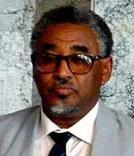Top Sudanese official says no Darfur peacekeepers needed
DOW JONES NEWSWIRES
 ABUJA, Nigeria, Aug 25, 2004 (AP) — A top Sudanese official insisted Wednesday that his country doesn’t need African Union peacekeepers to protect civilians in its troubled western Darfur region, but said the 150 AU troops already there to guard observers were welcome to help the government shut down its rebel opponents.
ABUJA, Nigeria, Aug 25, 2004 (AP) — A top Sudanese official insisted Wednesday that his country doesn’t need African Union peacekeepers to protect civilians in its troubled western Darfur region, but said the 150 AU troops already there to guard observers were welcome to help the government shut down its rebel opponents.
Sudan ‘s Agriculture Minister Majzoub al-Khalifa Ahmad [photo] maintained that foreign peacekeepers were not necessary in what the United Nations calls the world’s worst humanitarian crisis, where mostly Arab pro-government militias operate and an estimated 30,000 black Africans have died and some 1.2 million have fled their homes.
“The final role of peacekeeping in Darfur and the protection of civilians is the mandate of the government of Sudan only,” al-Khalifa Ahmad said on the sidelines of peace talks in the Nigerian capital, Abuja.
However, he said the 150 AU troops from Rwanda who are protecting 80 military observers to an often-violated cease-fire in Darfur could escort rebel groups fighting government forces back to their barracks.
“If we need an AU force for the protection and cantonment of the rebels, as part of the force now protecting the monitors, we have no objection,” he said.
He spoke on the third day of African Union-sponsored peace talks between Sudan and two southern mostly black African rebel groups who have took up arms 18 months ago over what they see as a unfair treatment by the government in their struggles with Arab countrymen.
Rebels and government delegates finally began work Wednesday on a formal agenda for the Abuja talks after rebels ended a deadlock by agreeing to discuss how their fighters could return to their barracks.
“For the sake of the continuation of the talks and the interest of the people of Darfur in general, we the two (rebel) movements … have decided to make accommodations about these points and to continue with the talks,” Ahmed Tugod Lissan, head of the rebel Justice and Equality Movement delegation told reporters.
The rebels still refuse to disarm until the Arab Janjaweed militia lay down their weapons, but bringing fighters into cantonment sites is widely seen as a step toward to demobilization.
The violence in Darfur stems from long-standing tensions between nomadic Arab tribes and their African farming neighbors over dwindling water and agricultural land.
